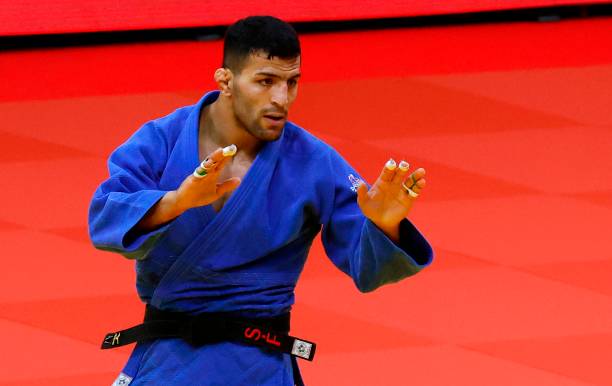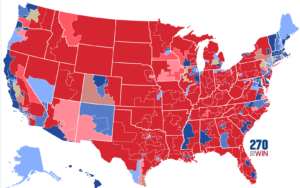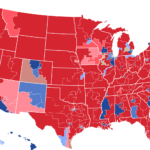At the 2019 Judo World Championships in Tokyo, aware fans were both excited and nervous about the -81kg weight class. Excited because two dominant judoka–Saeid Mollaei and Sagi Muki–were fighting incredibly and on a path towards a thrilling final. Nervous because Mollaei is from Iran and Muki is from Israel, leading to a potentially unfortunate situation.
After all, it is well-known that Iranian athletes refuse to compete against Israelis. The most famous example of this (though there are numerous) is Arash Miresmaeili. In 2004, Miresmaeili was the heavy favorite to take Gold in the -66kg weight class, also in Judo. Miresmaeili had the misfortune of being drawn to face an Israeli in the opening round. The Iranian did not withdraw, though. Instead, he was disqualified when he did not successfully weigh in at under 66 kg. Reports and rumors at the time indicated that he intentionally went on an eating binge before the weigh-in to disqualify himself. However, Miresmaeili was not punished for it (both Olympic and International Judo Federation rules prohibit refusing to fight someone for political reasons) because the IJF claimed they did not have real proof that Miresmaeili did it on purpose to avoid fighting an Israeli.
Ironically enough, Miresmaeili was elected the head of Iran’s judo federation in early 2019, setting the stage for the showdown between Muki and Mollaei at the World Championships in August.
2019 Judo World Championships
Judo fans witnessed incredible sport from both men at the World Championships. Muki is the best thrower in the world, and he manages to win matches with impressive form and big moves. The Israeli is a walking highlight reel for wins. Mollaei, meanwhile, is just a dominant force. No one can seem to move or throw him. He wears down his opponents–seemingly sometimes by sheer will–and looked unbeatable at the time. The matchup of strength vs strength was a thrilling one for fans. But would we get to see it?
Unfortunately, the answer was no. Mollaei did not withdraw in protest or with injury (a tactic often used by athletes refusing to fight Israelis, in order to grant plausible deniability). Instead, he simply lost. He appeared bothered by an ear issue and didn’t look like himself–he was battling a shoulder issue for a few matches–and thus fell to Matthias Casse in the semifinal. Casse went on to lose to Muki in the final.
It looked, for a moment, that we had simply witnessed Mollaei made uncomfortable by his matches throughout the day, culminating in a loss to a very talented, if slightly inferior, opponent. Even the best of the best can lose concentration or get hurt in a World Championships. Fans appreciated a good tournament, capped off by an impressive win by Muki in the final. Everything was above board.
Shortly after, though, we learned of a far more sinister story.
Pressure on Saeid Mollaei
Right after the tournament, the IJF published a detailed account of everything that happened to Mollaei that day. Iran’s sports minister ordered Mollaei’s coach to withdraw him before his Round of 16 match. (This, by the way, indicates the level of buzz in the sport about the impending Mollaei-Muki matchup. Iranian officials wanted Mollaei to withdraw while Muki was still three rounds away from reaching the final.)
Mollaei was devastated–he’d been dreaming of this moment his whole life–and burst into tears. He then, after talking to the President of the IJF, refused to concede. He won that match, and his quarterfinal as well. Iran then tried another tactic to force Mollaei to withdraw. They leaked media reports that he had already withdrawn due to his ear injury. When Mollaei still intended to compete in his semifinal, a group from the Iranian embassy illegally entered Mollaei’s warmup area. This time, Mollaei personally received a video call from Iran’s Olympic Committee President, warning Mollaei that police were at his parents’ house, ready to punish them if he competed.
Mollaei still competed, but the stress (and possibly physical ailments) were just too much for him, and he lost to Casse. In response, the IJF suspended Iran from all competitions. That didn’t help Mollaei, though. He could not go back to Iran, knowing what awaited him there.
From Refugee to Mongolia
Mollaei was granted refugee status, and was given asylum in Germany after leaving Tokyo. The IJF promised they would allow him to compete in the Tokyo Olympics as a refugee, though it became unnecessary. The President of Mongolia (which has a strong Judo program) offered Mollaei citizenship a few months later, and Mollaei accepted. The former Iranian now competes under the Mongolian flag.
In the meantime, Mollaei and Muki have posted photos together on Instagram and other social media. They refer to each other as “friends,” and Mollaei has publicly thanked Israeli Judo for what they have done for him. He competed in the Tel Aviv Grand Prix this past February, which–as far as my research could find–marked the first time a former Iranian citizen had competed at a sporting event in Israel since at least 2000.
Prior to the Olympics, Mollaei traveled to Israel to train with the Israeli Olympic team, which sent 12 judoka to the Games.
Saeid Mollaei and Sagi Muki at the 2021 Olympics
We are not guaranteed to see a meeting between Saeid Mollaei and Sagi Muki at these Olympic Games. Understandably, Mollaei has not yet found his 2019 level since that harrowing experience.
If Mollaei and Muki do meet, it will be in the semifinals, not the final. Because of the Olympic delay due to COVID-19, the 2021 World Championships were held before the Olympics. However, since the World Championships were in June, several top athletes (who had already guaranteed Tokyo qualification) chose not to compete.
The IJF still counts the points earned from those World Championships (and from the 2019 World Championships) towards the rankings, which they used to determine seedings. As such, Casse, who won the 2021 World Championships, was given the top seed over Muki, who elected not to compete in them. Mollaei, meanwhile, is seeded sixth, after the IJF did not give him any extra points due to the 2019 events. (There is precedent for adjusting a ranking for such things, though the IJF generally doesn’t do it.) As such, the second and sixth seeds are on the same side of the draw. It would be a shocking upset if Muki loses before the semifinals. Mollaei, though, will have to defeat #3 seed Tato Grigalashvili if he wants to get that far.
Athletic Boycotts of Israel in Tokyo 2020
Judo at these Tokyo Olympics has already seen withdrawals to avoid fighting Israelis. And, ironically enough, both of them involved the same match.
The -73kg weight class had 36 entrants. As such, four “play-in” matches were drawn among the last qualifiers to determine who will face seeds in the opening round. Fethi Nourine of Algeria and Mohamed Abdalrasool of Sudan were drawn to face each other, with the winner set to face sixth-seeded Tohar Butbul of Israel in the second round. Nourine withdrew, explicitly stating that he won’t face an Israeli. The IJF immediately announced a suspension and investigation, and Nourine was removed from the Olympic Village.
Nourine’s withdrawal gave Abdalrasool a walkover into the second round. Just this year, Sudan and Israel normalized relations. The two countries had officially been in a state of war since 1967. Because of the recent normalization (Sudan repealed its law forbidding Israeli imports in April), there was a chance the match would be played. However, Abdalrasool refused his walkover, and thus Butbul had no opponent to face in his Round of 32 match.
In the women’s heavyweight division, Tahani Alqahtani of Saudi Arabia was drawn against Raz Hershko of Israel in the first round. Saudi Arabia also categorically refuses to compete against Israelis, though relations have been somewhat warming (informally, at least) in recent years. If she plans on withdrawing, Alqahtani has not announced so yet.
Do not expect any withdrawals in the -81kg weight class, though. If Sagi Muki and Saeid Mollaei both reach the semifinals, they will fight each other. And it will be a fight for the ages.
Main Photo:












